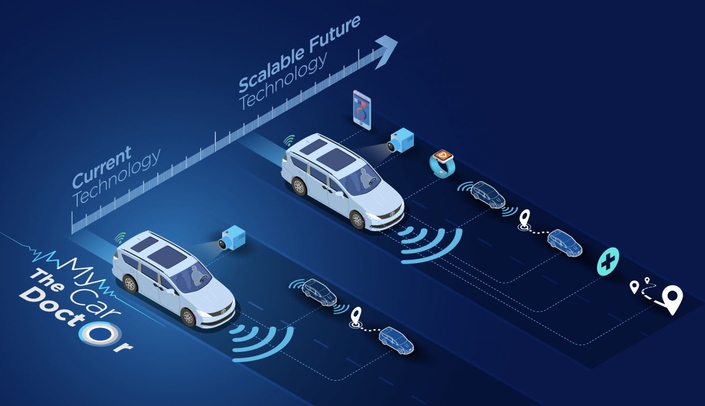Over the course of medical advancements, several tools have profoundly shaped the way physicians detect, understand and ultimately treat diseases and medical conditions.
The stethoscope. The microscope. X-rays. Magnetic resonance imaging (MRI).
Your vehicle?
The Toyota Collaborative Safety Research Center (CSRC) and UNMC are working together to explore how the technology found in today’s cars can be used to advance health care, clinical research, patient quality of life and even help improve how we detect and treat certain diseases in the future. They’ve named the project, "My Car the Doctor."
"We know from the medical community that detecting and diagnosing diseases early improves patient health and treatment," said John Lenneman, PhD, a senior principal research scientist at CSRC. "We also know from research that signs or symptoms of many diseases might show up in the driver’s seat long before they show up in a lab test or at the doctor’s office."
This is especially true for progressive diseases like Alzheimer’s, which affects more than 6 million people in the United States – a number expected to more than double by 2060. Research has shown that early signs of Alzheimer’s disease can manifest in driving behavior, such as the abnormal use of pedals, speed control issues or frequent navigational errors.
According to Jennifer Merickel, PhD, an assistant professor in the UNMC Department of Neurological Sciences, these changes in behaviors can be captured by sensors in today’s vehicles and converted into confidential, secure health information that can help doctors treat patients to help improve the patient’s quality of life.
"The availability of objective, real-world driving data can be used to create a more accurate portrait of patient health and function," said Dr. Merickel, the principal investigator of the UNMC research team partnering with CSRC on the project. "This can help overcome long-standing clinical barriers — improving our ability to detect disease early, help patients communicate with their doctors and provide doctors the information they need to make care decisions."
Matthew Rizzo, MD, chair of the UNMC Department of Neurological Sciences and physician leader, underscored how "this path-blazing approach builds on our long-standing and fruitful collaboration with the CSRC."
The nexus between vehicle technology and medical innovation extends well beyond tools to help clinical care. Information on a driver’s health can also help advance the ability to create new, safe and effective drugs or devices that help make patients’ lives easier, slow disease progression and reduce how much a disease affects a patient’s daily life.
For example, vehicle technology can be used to track the efficacy of drugs and medical devices, which could provide critical, longitudinal insight on treatment effectiveness for a wide variety of diseases and conditions. Other applications of this research aim to extend the safe personal mobility for those with certain medical conditions, enhancing quality of life for those who already live with progressive medical diagnoses. Understanding the ways certain chronic health conditions affect driving performance can guide the development of future health technologies from the vehicle.
This is not the first time Toyota or CSRC has worked to leverage vehicle technology to help identify or respond to changes in driver’s health. CSRC previously studied how vehicle sensors could be used to detect heart anomalies to help reduce traffic accidents. Additionally, Toyota’s Teammate Advanced Drive System — which is available on 2022 Lexus LS 500h AWD models — has an emergency driving stop system, a feature that can detect if a driver becomes incapacitated (by an acute health or other unforeseen event) and help bring the vehicle to a stop or maneuver it to the road shoulder.
For now, My Car the Doctor remains in an early, exploratory phase as researchers continue to evaluate potential project parameters and assess the feasibility of future pilot programs. But the long-term prognosis is extremely promising.
"Our work at CSRC has demonstrated how advanced safety technology is helping our driver’s stay safe and mobile, while helping make our roads a safer and healthier place," Dr. Lenneman said. "We’re just scratching the surface in terms of our ability to positively impact drivers’ health and well-being. That is the core question we’re so excited to continue to explore through this project."

Our 2013 Mercedes "already" detects "the sleepy driver" with a coffee cup showing up on the dashboard….This has been going on a long, long time. FYI